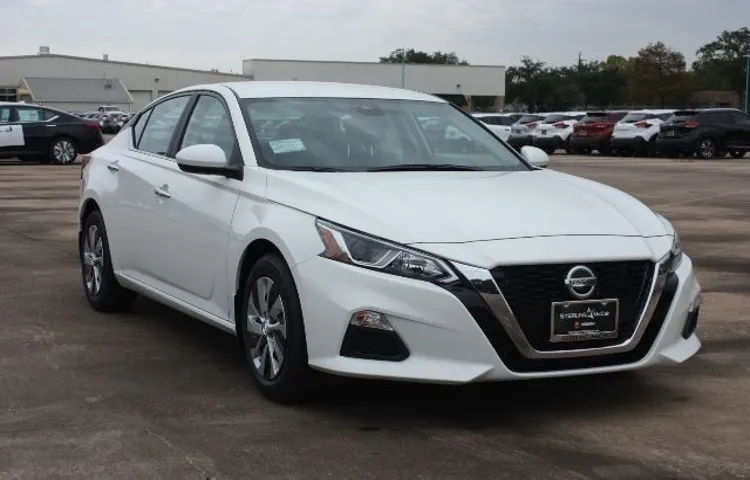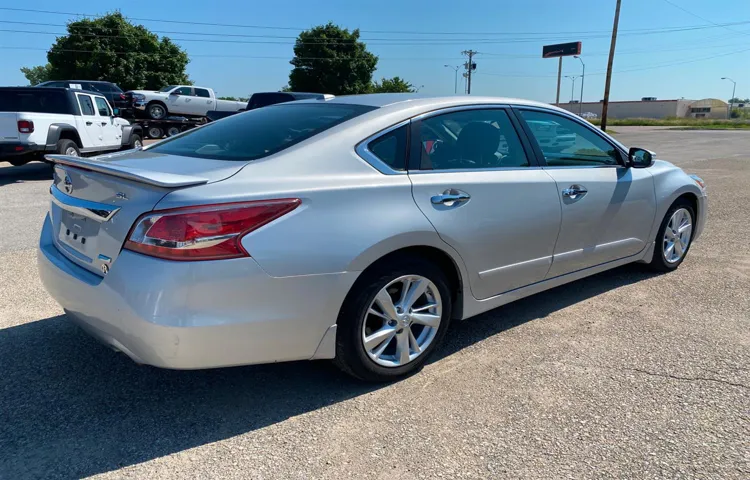If you’re on the hunt for a new car and considering the Nissan Altima, you might be wondering: is the Nissan Altima front-wheel drive? The short answer is yes, it is. But why does that matter, and what does it mean for you as a driver? First, let’s define what exactly we mean when we say a car is front-wheel drive. In short, it means that the power from the engine is sent to the front wheels, which are responsible for both driving and steering the vehicle.
This is in contrast to a rear-wheel drive car, where the power is sent to the rear wheels instead. So what are the pros and cons of a front-wheel drive car like the Nissan Altima? One major benefit is that it typically offers better traction in wet or snowy conditions, since the weight of the engine is over the front wheels, providing added grip. Additionally, front-wheel drive cars are generally more fuel-efficient and less expensive to manufacture.
However, there are also some downsides to front-wheel drive. For example, it can make the car feel less nimble or sporty, since the front wheels are doing most of the work. Additionally, front-wheel drive cars can experience torque steer, which is a phenomenon where the car pulls to one side under hard acceleration.
Overall, whether or not the Nissan Altima’s front-wheel drive is a pro or a con really depends on your personal driving preferences and needs. But regardless of what you’re looking for in a car, it’s important to understand the basics of how it works and what the implications are for your driving experience.
Table of Contents
Understanding Front-Wheel Drive
The Nissan Altima is generally front-wheel drive, meaning that the power from the engine is sent to the front wheels to drive the car forward. This type of configuration is most commonly found in cars due to its simplicity, cost-effectiveness, and efficiency. The benefit of front-wheel drive is that it provides better traction and stability on slippery roads, as the front wheels take on the responsibility of both steering and propelling the car forward.
However, some drivers complain about torque steer, which can cause the car to pull to one side under hard acceleration. Ultimately, whether the Nissan Altima’s front-wheel drive suits you will depend on your personal driving preferences and the environments you usually drive in.
Definition
Front-Wheel Drive Front-wheel drive refers to a vehicle’s powertrain technology where the engine transfers power to the front wheels via the transmission. This means that the front wheels are responsible for both steering the vehicle and generating forward motion. Front-wheel drive offers several advantages, including improved traction in slippery conditions, better fuel efficiency, and reduced vehicle weight.
It also allows for a more spacious cabin since there’s no need for a bulky transmission tunnel through the center of the car. However, it can also negatively impact handling, particularly at high speeds, and place more weight on the front of the vehicle, leading to faster tire wear. Front-wheel drive is commonly found in smaller cars, hatchbacks, and a large number of modern SUVs and crossovers.

Advantages
Front-wheel drive (FWD) is a type of vehicle configuration where the engine’s power is transmitted to the front wheels, providing the necessary force to move the car forward. Unlike rear-wheel drive, which focuses on power over the rear wheels, FWD is known for its superior traction on slippery roads, better fuel economy, and handling advantages. The weight of the engine and transmission is positioned over the driving wheels, enhancing stability and control while driving.
FWD also tends to be more affordable and easier to maintain than other configurations. With the engine components condensed into a smaller space, repairs and servicing can be accomplished without too much hassle. Even though FWD cars may lack the sporty appeal of a rear-wheel drive vehicle, the many benefits make it an attractive option to drivers looking for a budget-friendly and practical car.
Disadvantages
One of the disadvantages of front-wheel drive is that it can cause understeer, especially in high-performance vehicles. Understeer occurs when the front tires lose traction while turning, causing the vehicle to move straight rather than following the intended turn. This can be particularly dangerous in wet or icy road conditions.
Another disadvantage is that front-wheel drive can be less efficient than rear-wheel drive, as it requires additional weight on the front of the vehicle to handle the power delivery. This extra weight can also affect the car’s handling. However, front-wheel drive can still be an excellent choice for many drivers, particularly those who prioritize fuel efficiency, affordability, and safety.
It’s important to understand the advantages and disadvantages of different drivetrain systems before making a purchase. Overall, front-wheel drive is ideal for city driving, but if you’re looking for a performance vehicle, then rear-wheel drive might be a better option.
Nissan Altima: Drivetrain Options
If you’re wondering whether the Nissan Altima is front wheel drive, the answer is yes. All versions of the Altima, from the base models to the high-performance SR, come with front wheel drive as standard. That said, Nissan does offer all-wheel-drive as an option on some trims, which is a great feature for those who require extra traction and stability during inclement weather conditions.
The Altima’s standard front-wheel-drive configuration provides outstanding fuel economy, agile handling, and a smooth ride. It also allows for a more efficient use of space, making the interior roomier and more comfortable for passengers. Whether you’re commuting to work or driving on a road trip, the Altima’s front-wheel-drive setup delivers a responsive and enjoyable driving experience that’s hard to match.
Overall, the Altima’s front-wheel-drive offers a perfect balance of efficiency, performance, and driving dynamics that meets the demands of most drivers.
2013-2021 Model Years
Nissan Altima: Drivetrain Options If you are in the market for a midsize sedan, the Nissan Altima offers a range of drivetrain options to suit your driving needs. From the 2013-2018 model years, buyers could choose between a 5-liter four-cylinder engine, a
5-liter V6 engine, or a hybrid drivetrain that paired a 5-liter engine with an electric motor. The
5-liter engine offered 182 horsepower and 180 lb-ft of torque, while the more powerful V6 engine delivered 270 horsepower and 251 lb-ft of torque. The hybrid drivetrain, meanwhile, combined a 5-liter engine with an electric motor for a combined output of 250 horsepower.
From the 2019 model year onwards, the Altima received a new and more efficient 5-liter engine and a newly developed variable compression turbocharged engine. The
5-liter engine still boasts 182 horsepower and 180 lb-ft of torque, while the new 0-liter turbocharged engine delivers 248 horsepower and 273 lb-ft of torque. Both engines are paired with a continuously variable transmission (CVT), which provides smooth and efficient acceleration.
Additionally, all-wheel drive became available for the first time in the Altima’s history, providing enhanced traction and performance on all terrains and weather conditions. Overall, the Nissan Altima offers a range of drivetrain options to suit any driving style or preference. Whether you prioritize fuel efficiency, power, or all-wheel drive capability, the Altima has something to offer.
Earlier Model Years
If you’re in the market for an earlier model year Nissan Altima, you’ll find a few different drivetrain options to choose from. Depending on the year and trim level, you may come across a 5-liter four-cylinder engine or a
5-liter V The four-cylinder option typically offers better fuel economy, but the V6 provides more power for those who want a sportier driving experience. Many older Altima models also come with a continuously variable transmission (CVT) which offers smooth and efficient shifting.
No matter which drivetrain option you choose, the Altima is known for its comfortable ride quality and reliable performance. If you’re considering an older Altima, it’s always a good idea to have a pre-purchase inspection performed to ensure everything is in good working order.
Final Thoughts
If you are wondering whether the Nissan Altima is front-wheel drive, the answer is yes. The Altima has been designed to be a front-wheel-drive car since its inception, which helps to provide better traction, stability, and handling on the road. The front-wheel-drive feature also makes the Altima easy to maneuver, particularly in tight spaces and on slippery roads.
However, it may not be as suitable for off-road adventures or snow-filled terrains. Overall, the Altima’s front-wheel-drive system is an essential component of its performance and handling on the roads, and it has helped to make it one of the most popular sedans in its class. So if you are looking for a reliable and comfortable car for your daily commute, the Nissan Altima is an excellent choice.
Conclusion
In conclusion, the question of whether the Nissan Altima is front-wheel drive can be answered with a resounding yes! Much like a ballerina gracefully pirouetting on her toes, the Altima confidently dances down the road with its front wheels leading the way. So whether you’re navigating city streets or cruising on the open highway, trust the Altima’s front-wheel drive to keep you moving with style and precision.”
FAQs
What is the drivetrain type of the Nissan Altima?
The drivetrain type of the Nissan Altima is front wheel drive.
Does the Nissan Altima have all-wheel drive?
No, the Nissan Altima does not come with all-wheel drive. It is only available as a front-wheel drive vehicle.
Can the Nissan Altima handle well in snowy conditions?
Yes, the Nissan Altima performs well in snowy conditions thanks to its front-wheel drive system and advanced traction control technology.
How does the front-wheel drive system of the Nissan Altima compare to all-wheel drive systems?
While all-wheel drive may offer better traction in certain conditions, the front-wheel drive system of the Nissan Altima provides efficient power transfer and improved fuel economy.
What are the benefits of front-wheel drive?
Front-wheel drive vehicles tend to have better fuel economy, more responsive handling, and are typically less expensive than all-wheel drive counterparts.
Can front-wheel drive cars handle well on the track?
Yes, many high-performance front-wheel drive cars have proven to be capable on the track, such as the Nissan Altima’s NISMO variant.
Does the front-wheel drive system of the Nissan Altima provide adequate power for daily driving?
Yes, the Nissan Altima’s front-wheel drive system provides ample power for everyday driving situations, including highway cruising and accelerating from stoplights.


